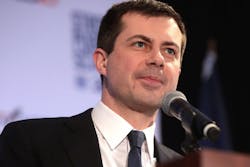Secretary Buttigieg says he believes there is bipartisan support for big infrastructure spending
As buzz continues to build in anticipation of a proposed infrastructure bill from the Biden administration, U.S. Transportation Secretary Pete Buttigieg recently sat down for an interview with The Journal., the daily news podcast from The Wall Street Journal.
Media outlets have recently reported that the administration plans to introduce a $3 trillion spending package, which will be split into two separate bills, the first of which would tackle infrastructure. This would include spending on climate change measures, broadband and 5G, as well as roads and bridges.
Below are several provided quotes from the interview with Secretary Buttigieg, who told The Journal. he believes there is bipartisan support for big infrastructure spending.
- On whether or not he believes there is bipartisan support for infrastructure spending:
- Buttigieg: “I really believe there is. I mean, first of all, around the country, this is, I think, broadly not considered a partisan issue. You know, in the public conversations that you've seen and the offline conversations that I'm having with House and Senate Republicans, you can feel there really is a desire to get things done that won't make it necessarily easy, but it makes it easier than a lot of other things that are hitting Washington this year."
- On the Biden administration’s reimagining of what infrastructure means and how the plan differs from those of the past:
- Buttigieg: “So this isn't going to be a replay of a 1950s vision of what infrastructure means. Don't get me wrong, there are places where we need to expand and build highways, but there also probably places where we need to reduce or remove them, or create alternatives for highway travel. I think the paradigm has really shifted from a vehicle obsessed vision to a vehicle inclusive vision of how people get around. You know, one of the things we've learned is on a congested highway, sometimes if you're not thinking it through, you add more lanes, you just get more cars and you get more congestion. So what we need to do is have an integrated strategy. Yes, that's driving. It's also rail, it's bike and pedestrian mobility where that's appropriate. And by the way, water is a surface, too. And one thing we're seeing, especially with the backups in the West, is that our ports are in need of some attention and some investment.”
- On the role climate change will play in the plan and why it’s being prioritized:
- Buttigieg: “Well, I think infrastructure is the best arena for us to break the old false choice of climate versus jobs and shift the conversation to job creation through climate action. I view this fundamentally as a jobs bill and one that's going to bring a lot of climate benefit. It means making sure that people have opportunities to work on everything from the manufacturing of electric vehicles, which would be supported by the president's vision of more charging stations to things like expanding our rail networks or fixing the highway infrastructure we have in ways that perhaps lead to less emissions to all of these things are connected. I would add that in addition to preventing climate disaster, we just got to adapt to what's already happening around us. And sometimes the right answer, when you're making a 50 or 100 year decision about a bridge or a tunnel is going to change when you're honest about things like sea level rise."
- His thoughts on the role local governments will play and how local priorities might be impacted:
- Buttigieg: “Well, look, as a former mayor, I tend to think that local governments make the best decisions. And I think often they'll be the first to acknowledge some of these climate realities because they don't have a choice not to. I mean, I remember puzzling over floodplain maps whose definition had clearly changed as we experienced our second once in a millennium flood just during my time as mayor. And so I don't think we're really going to have to fight local government on climate reality. If anything, they're typically ahead of us and sometimes ahead of their own states. One thing I noticed as a mayor was the total cost of ownership of all the asphalt I was in charge of plowing and paving and one pothole at a time. You start realizing that every square foot of asphalt in your city is something of a liability as well as an asset. And when you take that business lens to it, you start saying, OK, let's add more where we have to, but maybe we should be withdrawing a little bit where we can."
The full interview can be found here.
-----------
SOURCE: The Journal. from The Wall Street Journal
Image: Gage Skidmore via Flickr
